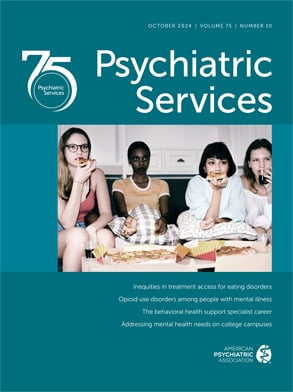To the Editor: Prevalence rates of depression among pregnant adolescents have been reported to be between 16 and 44 percent, at least twice as high as among pregnant adults and nonpregnant adolescents (
1). Depression in pregnant adolescents has been associated with poor compliance with prenatal care, low weight gain, smoking, and use of drugs and alcohol, thereby posing a risk of morbidity, such as low birth weight, for offspring (
2). Identification and treatment of depression are therefore an integral part of prenatal care.
With increasing frequency, primary care providers now screen for depression. The prevalence of depression among pregnant adolescents indicates the need for routine screening in community OB-GYN clinics. Providers could ask two questions, about depressed mood and anhedonia, that have been shown to be as sensitive as more protracted screens for identifying cases of depression (
3).
Access to and acceptability of treatment might be improved by offering treatment directly through community OB-GYN clinics. For adolescents connected with an OB-GYN clinic or provider, this service might circumvent stigma, symptoms of anxiety and avoidance, and lack of familiarity associated with accepting a referral. Providers might help their depressed patients more readily accept treatment by introducing them to a psychotherapist at the time the depression is identified.
No evidence exists that psychopharmacological treatment for depression is safe for the fetus, suggesting that psychotherapy be used instead. However, no research has been published on the efficacy of any psychotherapy treatment for depression among pregnant adolescents. Among nonpregnant adolescents, controlled clinical trials have established the efficacy of cognitive-behavioral therapy and, more recently, interpersonal psychotherapy (
4). These findings suggest that either modality or a combination of the two may be helpful to pregnant adolescents.
Longitudinal studies have shown that among pregnant adolescents depressive symptoms increase in severity between the second trimester and third trimester, often due to increased interpersonal stressors such as conflict with the baby's father or lack of support from the adolescent's mother (
5). Thus appropriate treatment should extend across the course of pregnancy and should at times include significant family members. It should also be conducted in a group format to improve interpersonal functioning and to enhance social support.

